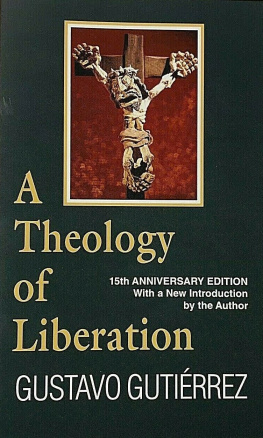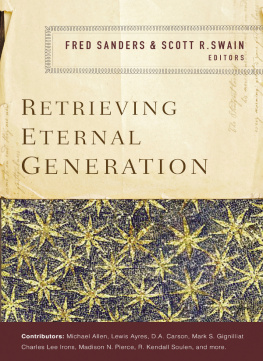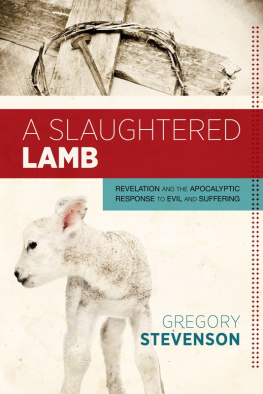GUSTAVO GUTIRREZ
ON JOB
God-Talk and the Suffering of the Innocent
Translated from the Spanish by Matthew J. O'Connell
Founded in 1970, Orbis Books endeavors to publish works that enlighten the mind, nourish the spirit, and challenge the conscience. The publishing arm of the Maryknoll Fathers and Brothers, Orbis seeks to explore the global dimensions of the Christian faith and mission, to invite dialogue with diverse cultures and religious traditions, and to serve the cause of reconciliation and peace. The books published reflect the views of their authors and do not represent the official position of the Maryknoll Society. To learn more about Maryknoll and Orbis Books, please visit our website at www.maryknolIsociety.org.
Originally published as Hablar de Dios desde el sufrimiento del inocente by Centro de Estudios y Publicaciones, 1986, Lima, Peru, and Instituto Bartolom de Las Casas, Lima-Rmae, Peru 1985 by Instituto Bartolom de Las Casas
English translation copyright 1987 by Orbis Books, Maryknoll, NY 10545
All rights reserved
Manufactured in the United States of America
Manuscript Editor: William E. Jerman
Unless otherwise indicated, Bible quotations for the Book of Job are from The New Jerusalem Bible , copyright 1985 by Darton, Longman & Todd, Ltd. and Doubleday & Company, Inc. Reprinted by permission of the publisher. The Revised Standard Version has been used for the other books of the Bible.
Library of Congress Cataloging-in-Publication Data
Gutirrez, Gustavo, 1928-
On Job.
Translation of: Hablar de Dios desde el sufrimiento del inocente.
Includes index.
1. Bible. O.T. JobCriticism, interpretation, etc. 2. SufferingBiblical teaching. 3. Liberation theology.
I. Title. II. Title: God-talk and the suffering of the innocent.
BS1415.2.G8813 1987 223'.106 87-5661
ISBN 0-88344-577-8
ISBN 0-88344-552-2 (pbk.)
To my parents,
who were the first to speak of God to me,
I dedicate these pages written
in seasons of suffering and hope.
To the people of Ayacucho who,
like Job,
suffer unjustly and cry out
to the God of life.
My mother told me:
If you stone the white fledglings,
God will punish you;
if you hit your friend,
the boy with the donkey face,
God will punish you.
It was God's sign
of the two sticks;
and the commandments of God
fitted into my hands
like ten more fingers.
Today they tell me:
If you do not love war,
if you do not kill a dove a day,
God will punish you;
if you do not strike the black,
if you do not hate the Amerindian,
God will punish you;
if you give the poor ideas
instead of a kiss,
if you talk to them of justice
instead of charity,
God will punish you,
God will punish you.
Mamma, is that really
our God?
Juan Gonzalo Rose, La Pregunta
A reference to the cross.
Contents
Introduction
T heology is talk about God. According to the Bible, however, God is a mystery, and at the beginning of his Summa Theologiae Thomas Aquinas states as a basic principle governing all theological reflection that we cannot know what God is but only what God is not. Must we not think, then, that theology sets itself an impossible task?
No, the task is not impossible. But it is important to keep in mind from the very outset that theological thought about God is thought about a mystery. I mention this here because it influences an attitude to be adopted in the effort to talk about God. I mean an attitude of respect that is incompatible with the kind of God-talk that is sure, at times arrogantly sure, that it knows everything there is to know about God. Jos Mara Arguedas poses the question: Is not what we know far less than the great hope we feel? This question will bring an unhesitating, humble yes from those who believe in the God of Jesus Christ.
Let me make it clear, however, that when we talk of mystery with the Bible in mind, we do not mean something that is hidden and must remain hidden. The mystery in this case must rather be expressed, not concealed; communicated, not kept to itself. E. Jngel puts it well: in the Christian perspective, the fact of having to be revealed belongs to the essence of mystery. According to Paul, revelation in this case is the revelation of the mystery which was kept secret for long ages but is now disclosed and through the prophetic writings is made known to all nations, according to the command of the eternal God, to bring about the obedience of faith (Rom. 16:2526). The revelation of the mystery of God leads to its proclamation to every human being: this is the special characteristic of the biblical message regarding mystery. Reflection on the mystery of God must therefore begin with God's resolve of self-communication to all nations (Matt. 28:19). The setting and requirements of the proclamation are fundamental presuppositions of any theologizing.
REVELATION AND THEOLOGICAL METHOD
The point I have just made leads me to discuss two connections as I begin these pages on talk about God.
1. The first is the relationship between revelation and gratuitousness. Christ reveals that the Father who sent him on a universal mission is a God of love. This revelation assigns a privileged place to the simple and the despised, as Jesus made clear: I thank thee, Father, Lord of heaven and earth, that thou hast hidden these things from the wise and understanding and revealed them to babes; yea, Father, for such was thy gracious will (Matt. 11:2526).
The words wise and understanding refer to a social and religious minority in Israel: the teachers, or doctors, of the law, the high priests, and the scribes. These were the men who sat on the chair of Moses (Matt. 23:2) and had taken possession of the key of knowledge (Luke 11:52). They were the ones who attributed the works of Jesus to the power of Beelzebul (see Matt. 12:24). They were important and religious persons. When Jesus said that the revelation given by the Father was hidden from the teachers, he was directly opposing the accepted and usual view of his day. He was challenging the religious and social authority of the experts in the law and saying that, because of the Father's predilection for them, the ignorant had a greater capacity for understanding revelation. This statement is one more sign of the originality of Jesus' teaching. He was here attacking the very foundation of the religious world of his timenamely, the identification of the primary addressees of God's word.
Over against the wise and understanding are the babes. The Greek word Matthew uses here ( npioi literally, very young children) carries a clear connotation of ignorance. This is the point of the contrast with the wise and understanding. Scholars agree that npioi here does not refer to moral or spiritual dispositions; rather the word has a certain pejorative overtone. The npioi in this context are the ignorant, those who must be led along the right path because they do not know how to guide themselves.
The little children are related to the poor, the hungry, and the afflicted (Luke 6:2023); to sinners and the sick (who are despised on this account) (Matt. 9:1213); to sheep who have no shepherd (Matt. 9:36); to the little ones (Matt. 10:42; 18:14); to those not invited to the banquet (Luke 14:1624). All these categories form a bloc, a sector of the people; they are the poor of the land.
The ignorance in question is not in itself a virtue or a merit that explains the divine preference. What we see here is simply a situation of need. By the same token, wisdom is not a demerit or something that provokes divine rejection. The wise are not necessarily proud in the moral sense; they may be, and indeed that is a danger for them. So too the ignorant may be humble, but they are not always such; humility is simply a possibility for them. It follows that the condition of being privileged addressees of revelation is the result not primarily of moral or spiritual dispositions but of a human situation in which God undertakes self-revelation by acting and overturning values and criteria. The scorned of this world are those whom the God of love prefers. This is a very simple matter, but for a mind that judges everything by merits and demerits, worthiness and unworthiness, it is difficult to grasp.











